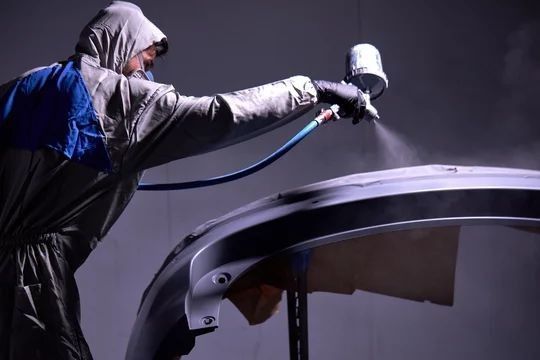Repair instructions
Changing Car Colors: Things to Consider, Methods, And Cost
Changing the color of your car can be a great way to refresh its look, but it’s important to consider a few key factors before diving in. You’ll want to think about potential regulatory and registration issues, the impact on your car’s resale value, and the overall costs involved. From professional repaints to vinyl wraps and plasti dip, there are several methods available, each with its pros and cons. Repainting your car can cost as much as $10,000, so it’s worth exploring your options carefully.
Things to Consider Before Changing the Color of Your Car
Changing the color of your car is more than just picking a new shade—it involves various considerations that could affect your car’s registration, value, and your wallet. Let’s break down some key factors to keep in mind before moving forward with a color change.

Potential Regulatory and Registration Issues
Your car’s color is officially recorded in its registration documents. In some states, you may be required to notify the DMV of a color change. While it’s generally not illegal to change the color, some local governments enforce stricter rules. For instance, fluorescent colors may be prohibited in certain areas. Before proceeding, it’s a good idea to check with your local DMV or city hall to understand the specific regulations in your area.
How It Affects a Car’s Value
Repainting a car can affect its resale value. If your vehicle is a classic or collectible, the new paint job could lower its market value, especially if the original paint is an important part of the vehicle’s appeal. Additionally, repainting involves a significant amount of prep work, which can get pricey. As a result, the money you spend on a new color might not be recovered when you sell your car.
How Much It Costs
The cost of changing your car’s color can vary greatly depending on the method you choose. Repainting your car is one of the more expensive options, given the preparation work involved, such as removing parts, sanding, cleaning, and repairing any dents. Don’t be surprised if a high-quality professional repaint costs upwards of $10,000, though basic jobs may start at around $1,000.
What Color to Choose
Choosing the right color is not just about aesthetics—it can also impact your car’s safety, maintenance, and repair costs. For example, white cars tend to be less prone to accidents due to better visibility in low-light conditions, according to a study from Monash University. Conversely, black cars may be more accident-prone. Additionally, some finishes, like matte paint, can be harder to maintain, with scratches being more noticeable and requiring a full repaint.
How Long It Takes
The process of changing your car’s color can take anywhere from a couple of days to several weeks. It’s a time-consuming task that involves sanding, filling dents, priming, and applying multiple layers of paint and clear coat. While the actual painting might not take long, each layer of paint needs to dry before the next is applied. DIYers should expect the process to take even longer due to the learning curve.
Ways to Change Car Colors
There are three primary methods for changing your car’s color: professional repainting, vinyl wrapping, and plasti dip. Let’s look at each method in more detail.
Professional Repainting
Repainting your car is the most traditional and permanent way to change its color. This process involves stripping the existing paint, preparing the surface, and applying a new coat of paint, often with multiple layers of primer and clear coat.
Pros:
- Highly customizable color choices.
- Provides a durable finish.
- Great for fixing scratches, dents, and other imperfections.
- Long-lasting and easy to maintain.
Cons:
- Can be expensive.
- The process is time-consuming.
Cost:
A professional repaint can cost anywhere from $1,000 to $10,000, depending on factors like paint quality, the size of the vehicle, and the complexity of the job.
Vinyl Wrapping
Vinyl wrapping is an alternative method where a vinyl film is applied over your car’s original paint. This method involves preparing the vehicle’s surface, applying the vinyl wrap, and trimming it for a seamless finish.
Pros:
- Can achieve both glossy and matte finishes.
- Customizable patterns and colors.
- Protects the original paint from damage, such as UV rays and scratches.
- Removable, allowing you to restore the car’s original look if desired.
Cons:
- Less durable than a professional repaint.
- Can be more expensive than painting, depending on the complexity.
Cost:
Vinyl wrapping typically costs between $60 and $1,500 for partial wraps (e.g., hood, fenders, roof). Full car wraps can cost between $2,000 and $5,000, depending on the materials and design.
Plasti Dip
Plasti Dip is a rubberized coating that can be sprayed onto your car for a temporary color change. It’s easy to apply and remove, offering a flexible option for those looking to switch things up frequently.
Pros:
- Can be removed easily without damaging the underlying paint.
- Provides some protection against UV rays and light scratches.
- Works well in extreme temperatures.
Cons:
- Limited color options.
- May not last as long as a vinyl wrap or professional paint job.
- Vulnerable to damage from thinners and solvents.
Cost:
Plasti dip services generally cost between $520 and $850, depending on the extent of the coverage and any additional customizations.
Where to Get Touch-Up Paint Without Leaving Your Home
If you’re just looking for minor touch-ups to your car’s color, many online retailers offer touch-up paint kits that can be shipped directly to your home. These kits can help you fix small scratches and chips without the need for a full repaint.
Changing the color of your car is a big decision, both financially and aesthetically. Whether you go for a full repaint, a vinyl wrap, or plasti dip, it’s crucial to weigh the pros and cons and understand the costs involved to ensure you’re making the best choice for your vehicle.
